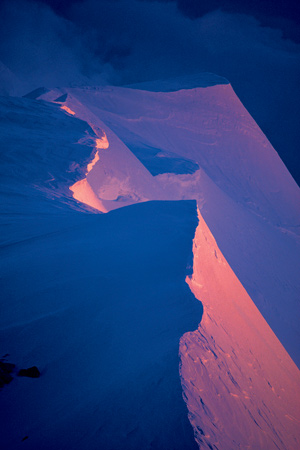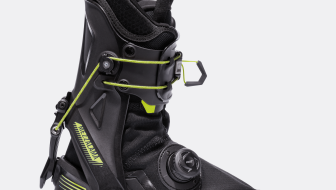
The glow from beyond on Alaska’s Denali, 1979. [Photo] Galen Rowell
Steve McQueen said, “I’d rather wake up in the middle of nowhere than in any city on earth.” Edward Abbey referred to the urban scene as “syphilization.” We read between the lines and suspect a cure for the subtlest of modern maladies, the condition caused by the strained nervous sense of urgency that seems to define life in the city.
In my job as a backcountry ski guide I see people arrive at my doorstep from almost incomprehensibly busy lives in the city, ready to leave all the stress and schedules and meetings and freeway traffic alone for a while. They need time to re-create, to recharge the old batteries, to think of nothing and reflect on everything, indeed to put life into perspective. Mostly they need to go skiing on the high and distant horizons. But skiing and mountains are only the medium for this revitalization, not the message. The message we receive is the importance of a quiet mind and satisfied soul.
Suddenly my job description is so much more than expert skier, tireless trail breaker, beast of burden, clever navigator, head chef and avalanche forecaster. In addition, I become confidant, confessor, entertainer, therapist, friend and perhaps even the Right Reverend Bardini, First Church of the Open Slopes. It is a job with great responsibility, and not just those related to hazard evaluation and risk management.
As a ski guide I have the pleasure of bringing people and mountains together to the greater benefit of both. I notice that, when people have been touched by the wild lands, they are forever changed, forever more aware. They will never again see snow and mountain peaks and wind-sculpted tree trunks without being affected inside differently than before they knew of such things, and they will return time and again to get in touch and be touched.
Certainly these are some of the deepest joys of skiing in wild places. It becomes important then, in fact essential, to savor and share these places and feelings. When we travel far afield to ski, we often find not just some intoxicatingly remote landscape but the convoluted topography of our own souls.
This is the value of skiing in, and being with, the lofty terrain of the mountains. These are the advantages of taking the high ground. I have been out into the great hinterlands of the backside of beyond, and my life is rich because of it. I am a wealthy man who just happens to be broke most of the time, but I’m in good company.
John Muir stated simply, “Climb the mountains and get their good tidings.” Bill Koch once said, “The world would be a little better place to live if more folks went cross-country skiing.” I must agree with both of my learned colleagues.
Maybe world peace is just a few telemark turns away? Maybe it’s worthy of being a movement? With bumper stickers! Telemarking is peace—ski the backside of beyond. Why not?
I know of little else like a good day in the backcountry that gives me such incredible tranquility. This is especially true in times when life seems tediously long. But, as we know, life is short. Which reminds me. I saw this rather interesting Sharper Image catalog item, a clock of sorts, but this timepiece ticks off the time the average person has left to live.
Standing and watching it is a little unnerving. A minute goes by and then another and then both are gone forever. Three-hundred-and-sixty-five days a year we get the opportunity to have a fresh start at life. A new day and fresh powder reminds those of us who slide on snow that skiing is life. Passion and vitality for living are some of the gifts we receive from skiing, particularly skiing in the great beyond.
One need not travel to the North Pole or the Himalaya or the Andes or any of the high, hidden places of the world to know these things. Outback might simply mean skiing out back—out in the quiet woods behind the barn or perhaps skiing through Central Park when the fist of winter grips the city in an icy gridlock. It could be skiing down a New England hillside or across the great expanse of a
Heartland cornfield.
You are out on the backside of beyond when you feel the crisp bite of winter air in your lungs and the sting of wind-driven snow on your face and when you realize how insignificant you are in the face of such harsh adversity. That relativity, which comes from knowing the wild places, is essential to our wellbeing and yet we so often stay home, stay inside and insulate ourselves from it. I say, resist the urge to be complacent about experiencing the brutally beautiful joys of the backcountry skiing life.
Go, my friends. Don’t delay. Lose yourself and maybe you’ll find yourself—on the backside of beyond.









Related posts:
Return to Evil: Hilaree Nelson revisits oblivion to ski India’s 21,252-foot Papsura
The Last Hill Until the Next One
The Trendsetter: How Diny Harrison, the first North American woman to earn an international mountain…
Illusions of Safety: After a friend’s avalanche death, a lesson in intuition